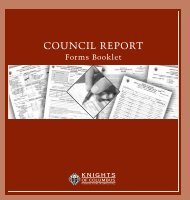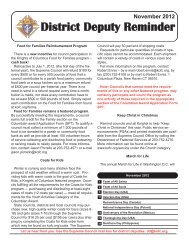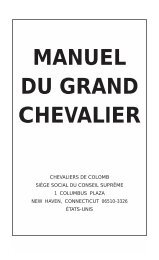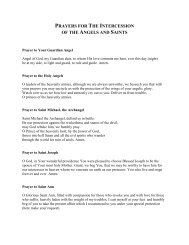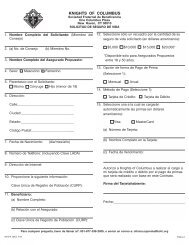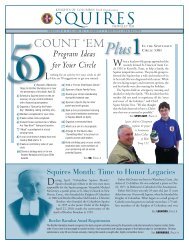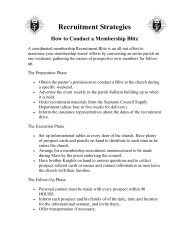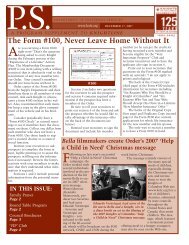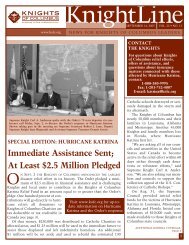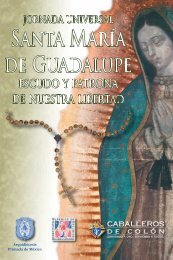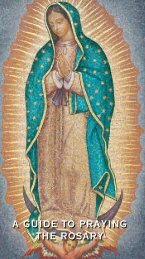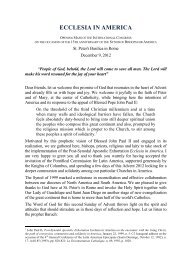CATHOLIC WORD BOOK - Knights of Columbus, Supreme Council
CATHOLIC WORD BOOK - Knights of Columbus, Supreme Council
CATHOLIC WORD BOOK - Knights of Columbus, Supreme Council
You also want an ePaper? Increase the reach of your titles
YUMPU automatically turns print PDFs into web optimized ePapers that Google loves.
the Annunciation, in the Infancy<br />
Narrative (Hail Mary, full <strong>of</strong> grace, the Lord<br />
is with you, blessed are you among women; Lk<br />
1:28); the words addressed to Mary by her<br />
cousin Elizabeth on the occasion <strong>of</strong> the<br />
Visitation (Blessed is the fruit <strong>of</strong> your womb;<br />
Lk 1-42); a concluding petition (Holy<br />
Mary, Mother <strong>of</strong> God, pray for us sinners now<br />
and at the hour <strong>of</strong> our death. Amen.). The first<br />
two salutations were joined in Eastern rite<br />
formulas by the sixth century, and were<br />
similarly used at Rome in the seventh<br />
century. Insertion <strong>of</strong> the name <strong>of</strong> Jesus at<br />
the conclusion <strong>of</strong> the salutations was<br />
probably made by Urban IV about 1262.<br />
The present form <strong>of</strong> the petition was<br />
incorporated into the breviary in 1514.<br />
Heaven: The state <strong>of</strong> those who, having<br />
achieved salvation, are in glory with God<br />
and enjoy the beatific vision. The phrase,<br />
kingdom <strong>of</strong> heaven, refers to the order or<br />
kingdom <strong>of</strong> God, grace, salvation.<br />
Hell: The state <strong>of</strong> persons who die in<br />
mortal sin, in a condition <strong>of</strong> self alienation<br />
from God which will last forever.<br />
Heresy: The obstinate post baptismal<br />
denial or doubt by a Catholic <strong>of</strong> any truth<br />
which must be believed as a matter <strong>of</strong><br />
divine and Catholic faith (Canon 751, <strong>of</strong><br />
the Code <strong>of</strong> Canon Law). Formal heresy<br />
involves deliberate resistance to the<br />
authority <strong>of</strong> God who communicates<br />
revelation through Scripture and tradition<br />
and the teaching authority <strong>of</strong> the Church.<br />
Heretics automatically incur the penalty <strong>of</strong><br />
excommunication (Canon 1364 <strong>of</strong> the<br />
Code <strong>of</strong> Canon Law). Heresies have been<br />
significant not only as disruptions <strong>of</strong> unity<br />
<strong>of</strong> faith but also as occasions for the<br />
clarification and development <strong>of</strong> doctrine.<br />
-36-<br />
Heresies from the beginning <strong>of</strong> the Church<br />
to the 13th century are described in Dates<br />
and Events in Church History.<br />
Hermeneutics: See under the section<br />
Interpretation <strong>of</strong> the Bible.<br />
Hermit: See Anchorite.<br />
Heroic Act <strong>of</strong> Charity: The completely<br />
unselfish <strong>of</strong>fering to God <strong>of</strong> one’s good<br />
works and merits for the benefit <strong>of</strong> the<br />
souls in purgatory rather than for oneself.<br />
Thus a person may <strong>of</strong>fer to God for the<br />
souls in purgatory all the good works he<br />
performs during life, all the indulgences<br />
he gains, and all the prayers and<br />
indulgences that will be <strong>of</strong>fered for him<br />
after his death. The act is revocable at will,<br />
and is not a vow. Its actual ratification<br />
depends on the will <strong>of</strong> God.<br />
Heroic Virtue: The exemplary practice <strong>of</strong><br />
the four cardinal virtues and three<br />
theological virtues; such virtue is sought<br />
in persons considered for sainthood.<br />
Heterodoxy: False doctrine teaching or<br />
belief; a departure from truth.<br />
Hierarchy: The hierarchy <strong>of</strong> order who<br />
carry out the sacramental, teaching, and<br />
pastoral ministry <strong>of</strong> the Church; the<br />
hierarchy consists <strong>of</strong> the pope, bishops,<br />
priests, and deacons; the pope and the<br />
bishops give pastoral governance to the<br />
faithful.<br />
Holy Father: A title used for the pope; it is<br />
a shortened translation <strong>of</strong> the Latin title<br />
Beatissimus Pater, “Most Blessed Father”<br />
and refers to his position as the spiritual<br />
father <strong>of</strong> all the Christian faithful.



